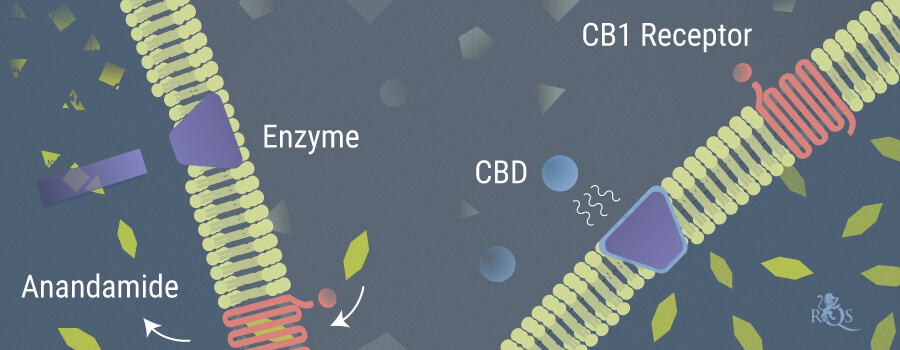.

Understanding Anandamide and Its Relationship to THC and CBD
The body's endocannabinoid system is vast and has profound implications. Anandamide, an endocannabinoid, is perhaps one of the most important molecules involved. But what does it do? How do THC and CBD affect it? And, most importantly, what can we do with it?
Contents:
Anandamide occurs naturally in the body, as one of its endocannabinoids. But what are the effects of anandamide? Wide-ranging, it appears. It looks as though this molecule could have untold effects on the body, and if we’re able to harness it, a whole host of powerful new treatments could become available.
Certain phytocannabinoids present in the cannabis plant are known to boost levels of anandamide in the body, paving the way for controlled application.
What Are Endocannabinoids?
Before we get into anandamide, it’s important to understand more generally what endocannabinoids are. These are cannabinoids created naturally in the human body. “Endo” means endogenous, which itself means “of the body”. It may come as a surprise to some that the body has its own system of creating and using cannabinoids—known as the endocannabinoid system (ECS)—but it appears to play a vital role in our health and well-being.
The ECS has been linked to memory and cognition, motor control, maintenance of homeostasis, regulation of cell growth, and more. Though it is not fully understood, it could turn out to be one of the body's essential systems.
There are two main receptors that relate to the ECS: CB1 and CB2 receptors. These receptors are found in almost every part of the body. Anandamide is one of the body’s endocannabinoids that has a strong affinity for these two receptors.
What Is Anandamide?
Anandamide is a naturally occurring endocannabinoid. Its name derives from the Sanskrit word for “bliss” or “happiness”. It is thus known as the “bliss molecule”. Though it has powerful effects, it is only naturally produced in small quantities, and as required. Some research suggests that some people may even have an endocannabinoid deficiency[1], which could account for certain illnesses.
Despite its name, we mustn’t assume that more anandamide is always good. Like with all of the body’s processes, balance is key. There are some links that suggest too much anandamide—resulting in overstimulation of the CB1 receptor—could disrupt the body’s reward system and increase the likelihood of diseases like obesity[2].
Anandamide is not water-soluble, meaning it cannot be broken down in water. So in order to break it down, the body produces FAAH (fatty acid amide hydrolase) and MAGL (monoacylglycerol lipase). If it weren’t for these enzymes, anandamide would be continually present in the body.
It is worth noting that, generally, anandamide that is produced naturally is not capable of causing a noticeable high—though it may be responsible for feelings of bliss, euphoria, and elation.

Anandamide and Homeostasis
It is thought that anandamide plays a role in homeostasis. This is the process whereby the body maintains regular functions. For instance, homeostasis is what keeps the body cool when it’s hot, and warm when it’s cold. Without it, we’d be pretty screwed. Anandamide is not the only endocannabinoid that affects homeostasis, but just a single part of the larger ECS, which helps to regulate the entire body.
Anandamide and Reward
In research surrounding anandamide and the reward system[3], it has been found that increasing anandamide, and thus stimulating the CB1 endocannabinoid receptor, changes feeding habits and affects free choice. It was observed that when concentrations of anandamide were increased, study participants would opt for the easier, less effortful choice.
The implications are that anandamide is involved in the body's pleasure and reward system, much like dopamine.
Phytocannabinoids: How Do THC and CBD Affect Anandamide?
But where does cannabis come into all of this? Cannabis has its own cannabinoid system, and the cannabinoids it produces are known as phytocannabinoids. There are known to be at least 113 of them, and there are quite possibly more that we do not yet know of. Many, if not all of these, can interact with the human body’s ECS, and each has differing effects.
The two we’ll focus on today are the two you’ve probably heard of most: THC and CBD. Despite being the two most abundant cannabinoids found in the cannabis plant, they interact with the ECS in very different ways, and as such have very different effects.
Anandamide and THC
Delta-9 tetrahydrocannabinol (THC) is probably the most well-known of cannabis’ cannabinoids. It’s the one that causes the famous high. THC interacts directly with the body’s CB1 and CB2 receptors. In a sense, it mimics anandamide in the body, finding itself able to bind to the same receptors. This is why it has such a profound effect—it’s like a huge dose of anandamide.
Due to the prevalence of the ECS, with receptors found all over the body, the effects from THC are wide-ranging and versatile. What’s more, while enzymes in the body can easily break down anandamide, they find it much more difficult to do so with THC. This is why highs from THC can last many hours, whereas the effects of anandamide are relatively short-lived.

Anandamide and CBD
CBD works in a very different way to THC. It has almost no affinity for CB1 or CB2 receptors, and in fact appears to block them, meaning, if anything, it limits their uptake. This is posited to be the reason that CBD appears to “counteract” the psychotropic effects of THC.
CBD also inhibits the body’s production of FAAH and MAGL, the enzymes used to break anandamide down. In doing so, it indirectly increases the concentration of anandamide available to the CB1 and CB2 receptors, meaning there is more of it. Whereas THC floods the body with a chemical similar to anandamide, CBD gives the body greater access to anandamide itself.
Research Into Anandamide's Therapeutic Potential
Given the profound effects that manipulating anandamide in the body can have, a huge amount of research is now being dedicated to what application these effects may have, especially in a clinical setting.
It is still the early days, but results are promising, and as cannabis legislation slackens across the world, results should come in faster. In recent years, focus has shifted toward CBD over THC, as its non-psychotropic properties make it a versatile and safe substance to study.
Below we’ll go into some interesting studies about anandamide and how its manipulation may be of benefit to humans. It’s worth noting that many of these studies did not use CBD, though some of the mechanisms are similar. So whether CBD can be used as a worthwhile way to modulate anandamide is yet to be confirmed.
Anandamide and Addiction
Preclinical research indicates that anandamide may play an important role in helping people overcome addiction[4]. Researchers administered FAAH and MAGL inhibitors, meaning anandamide was not broken down so easily in the body, essentially increasing its concentration. Using mice, they noticed that opioid withdrawals were less severe in those that had heightened levels of available anandamide, indicating a possible avenue for addiction treatment.
Anandamide and Inflammation
In one study, rats were given experimental periodontitis[5]—essentially inflammation of the gum. Anandamide was then injected into their back legs. In those rats given the endocannabinoid, it was found that activation of the CB1 and CB2 receptors reduced markers associated with periodontitis, even in a stressful setting.
Links between endocannabinoids and the inflammatory response have gained a lot of attention, and this is just one of many examples suggesting a positive relationship.
Anandamide and Neuroprotection
It seems that anandamide plays a role in neuroprotection[6], the protection of cells from degradation and death. This seems to be particularly related to the CB2 receptor. Therefore it has been speculated that the ECS could play a vital role in combatting neurodegenerative conditions. Exactly what the mechanisms are that allow this to happen remain unclear, but it appears to have something to do with apoptosis—programmed cell death.
Anandamide and Tumour Growth
By binding to CB1 receptors, it appears anandamide could potentially inhibit growth of the K-Ras protein[7], involved in cell growth and proliferation. In studies using rats, researchers have been able to slow the growth of certain tumours with the application of Met-F-AEA—a stable analogue of anandamide. This study was conducted in vivo, meaning the cells were present in the rats during the research, rather than being isolated outside the rat (ex vivo). This opens the possibility of extending this sort of research into tumour growth in humans—at least where K-Ras proteins are involved.

How To Increase Anandamide
There are a few fairly easy ways to boost anandamide in the body, and not all of them involve smoking weed. Indeed, there are anandamide foods and anandamide supplements available for your consumption. You don't just need to consume things either, there are activities you can do too.
Get Active
It's no mystery that exercise improves a person's sense of well-being. Generally, other than an overall sense of feeling fit and well, this is attributed to endorphins. However, it has been discovered that concentrations of anandamide rise in the half-hour or so following physical exertion. So by going for a run or a swim you're not just making yourself fitter, but actually upping your endocannabinoid count!
Chocolate
We all love chocolate, right? Who knew it could be good for you! Chocolate is thought to have properties that both slow the breakdown of anandamide and cause more to be produced. If correct, this means that chocolate has a twofold anandamide-boosting factor.
To get the most from your chocolate, you want the purest of the pure, though. A milk chocolate bar simply won’t cut it. To really boost anandamide levels, you’re going to want to get your hands on some cacao nibs, giving your body the stuff it craves. That way, you get to cut down on sugar too!
Be West African
This one is easier said than done. A study found that those nations which tended to rate themselves as the happiest, also shared the same genetic mutation[8]. The populations of Ghana, Nigeria, Colombia and Mexico scored the most highly. They also showed the highest prevalence of the A allele in FAAH, which helps prevent the breakdown of anandamide. But if you're not from these places, you might have to do some of the other things on this list.
Black Truffles
This is the only other food source known to boost anandamide. These elusive and expensive truffles may not be the sort that make you trip, but that doesn’t mean they won’t make you happy. Found by highly trained pigs, these gourmet truffles may turn out to be more than a culinary fad. Perhaps the reason they’ve been so sought-after all of these years is their anandamide-boosting properties and the subsequent feelings of wellness they invoke.
Kaempferol
Sounds like a dangerous German drug right? In actual fact, kaempferol is a flavonoid found in certain fresh fruit and vegetables, such as apples, tomatoes, grapes, onions, broccoli and potatoes. This compound inhibits FAAH, increasing the amount of anandamide available.
Get Some Love
It appears that oxytocin production also stimulates anandamide production. Indeed, it seems that the two may work together to help forge social bonds. There are a few ways to produce oxytocin, and the easiest are physical. Having sex, or getting a massage stimulates the production of oxytocin and anandamide. To a lesser extent, non-physical interaction can too. However, tactile interaction is the most effective means to get anandamide via oxytocin.

Phytocannabinoids
Of course, you could just have a smoke if you want to push your anandamide levels up. If you’re feeling like a massive hit, puff on some THC-rich weed to mimic anandamide and elevate yourself for a few hours.
If, on the other hand, you just want to chill out a little and are after something a little more subtle, find yourself a strain teeming with CBD. By inhibiting the breakdown of anandamide, you're giving yourself a natural and gentle boost, full of potential goodness. Mix this with some dark chocolate and a couple of truffles, and who knows what might happen?
Anandamide: Much More To Learn About the Bliss Molecule
It’s clear that anandamide and the broader ECS play a crucial role in our health and well-being. From mental health to physical wellness, the manipulation of the ECS could have very profound implications for us.
But what role can cannabis play in this? While speculation is rife, and not without some pretty compelling evidence, it’s too early to make any conclusions yet. What we do know is this: by affecting anandamide and other parts of the ECS, cannabinoids are able to work as safe manipulators of this system, meaning they may be able to play a role in the development of future treatments.
- Clinical Endocannabinoid Deficiency Reconsidered https://www.ncbi.nlm.nih.gov
- The Expanded Endocannabinoid System/Endocannabinoidome as a Potential Target for Treating Diabetes Mellitus https://link.springer.com
- Effects of anandamide administration on components of reward processing during free choice https://www.sciencedirect.com
- AM404 - an overview https://www.sciencedirect.com
- Anti-inflammatory effect of the endocannabinoid anandamide in experimental periodontitis and stress in the rat - PubMed https://pubmed.ncbi.nlm.nih.gov
- The endocannabinoid system, anandamide and the regulation of mammalian cell apoptosis https://www.nature.com
- Control by the endogenous cannabinoid system of ras oncogene-dependent tumor growth https://faseb.onlinelibrary.wiley.com
- Genes may contribute to making some nations happier than others https://www.sciencedaily.com











































